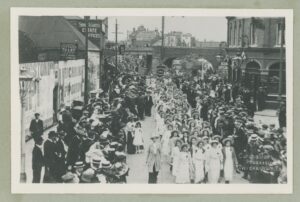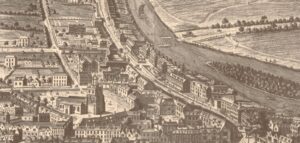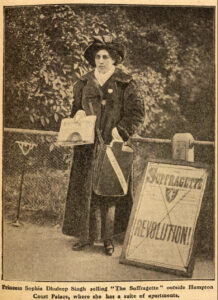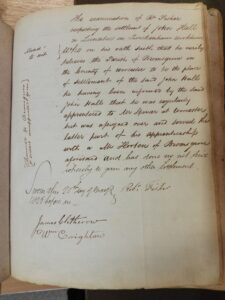Explore your local stories
I’m here to help people find the stories that matter to them. The real stories. Stories of the lives lived, here in the London Borough of Richmond upon Thames.
It’s Explore Your Archive week, what better time to hear from archivist Janine Stanford. Janine oversees the vast collection of borough archives located within the local studies collection and in off-site storage. Preserving materials and helping people find information are just a couple of examples of Janine and the Local Studies & Archive team’s responsibilities.

There’s a deep sense of connection that can come from learning about the roots of a place, unveiling the links, the continuities, the changes that tie this place we stand in now to the decades and centuries that have come before. To the people that have come before.
I cross Richmond Bridge and think about what it was like for the people of the past: horses toiling up the slope that cyclists still feel today; the tolls that people used to have to pay just to cross; and before the bridge, the ferry so very close by.

How different, how separate must the Twickenham and Richmond banks have felt to those who lived before the bridge was built? Or was the ferry crossing so simple and easy for people that they gave it little thought?
It feels like a privilege to have this information about the Borough at my fingertips, but it is a privilege that I and my colleagues can share with you.
What stories might you find?
We work in the Local Studies Library and Archive, based in the Old Town Hall in Richmond. Our job is to give you access to the stories and the information that our books and archival records hold. Anyone can visit us during our opening times: there is no registration needed and no charge to view the collections. You don’t have to live locally either; some of our visitors come from the other side of the world.
Many people who visit us have never used an archive before. Our staff are always on hand to help and can walk you through the process, from discovering the best places to start looking, to learning how to interpret historic documents.
What people will you discover?

Perhaps you might discover Princess Sophia Duleep Singh. She was a daughter of Duleep Singh, the last Maharaja of Punjab, who had been deposed as a child by the British Empire and brought to Victorian Britain where he lived for much of his life.
Princess Sophia lived in Faraday House on Hampton Court Green where she’s known to have sold “The Suffragette” as pictured here in 1913.
A renowned activist, Princess Sophia used her fame to support the causes she believed in and played a major part in the women’s suffrage movement of the early 20th century.

Or you might find John Hall. In 1826 John was living in the workhouse on Twickenham Green and was described as “a Lunatic”. John hadn’t always lived in the workhouse. Earlier in life he had been apprenticed to a Mr Horton in Bromsgrove.
The laws at the time meant that people who didn’t have enough money to live independently, or who weren’t able to work due to a disability, should be supported by their home parish, although this “support” could often mean being made to live in the parish workhouse. If a person had no official connection to the place they were living when they found themselves needing support, the local parish did not have to help them and so people were often sent back to the place where they were seen to have an official “settlement”.
John found himself sent to Bromsgrove, the place of his apprenticeship, presumably to be placed in the workhouse there.For people like John, one of the few times they entered the official record at all was at times like these, when they found themselves in a situation needing support and the local parish was trying to determine if they had to help or not.
What will you find?
If you want to learn about the people and stories which make up your communities, find out what’s on your doorstep, or even access records of past decisions that impact your life today, the Local Studies Library and Archive is here to help.
If you would like a taster of just some of the information we hold, try searching for a street name in the online catalogue and perhaps discover historic photographs and architects’ plans.
What the customer’s have to say
“Thank you so much for this information. It was quite emotional reading it, especially as I have recently found out some other information about poor Ella. It seems she had such a tragic life, though thankfully she left behind two daughters, one of whom was my amazing Nan. Having this detail helps piece together Ella’s too short life and it means so much. I only wish my Nan was still here to be able to share it with her.”
– Jane
“I think the local archive is such an important resource for people, I would recommend to anyone. It was my first visit to Richmond and enjoyed the experience immensely, even the thunderstorm on my arrival!
The help/guidance I received arriving at the archive and during my visit was excellent and I feel that my positive experience must somehow reflect all the important work you guys do there to gather and make available to us the records you hold. Thanks again.”
– Andrew Greenslade, Wiltshire
“Thank you for the note. Indeed it has been very rewarding, particularly for my great grandfather Henry. He has been more difficult than many to explore, due to no or very little information being shared from my grandfather (Henry’s son). My grandfather wanted nothing more to do with Henry after my grandfather got married (1941 in Horley) and Henry turned up drunk to his wedding. After learning more about Henry I can start to appreciate why things turned out like this.”
– Anthony Rudd
Janine Stanford
Archivist


Leave a Reply